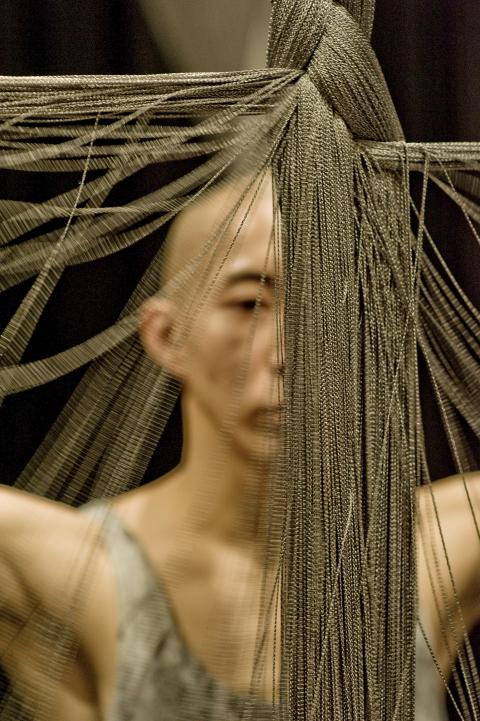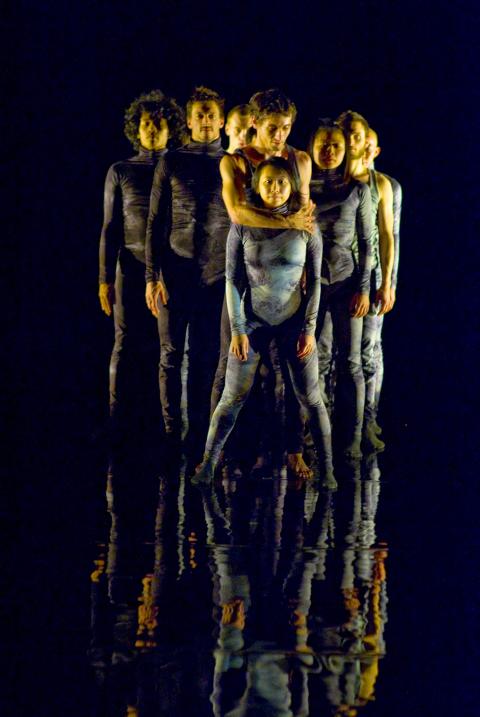What happens when you take five French hip-hop artists, five Taiwanese dancers, a Taiwanese fashion designer who has made an international name for himself with sculptural knits and place them in the hands of French hip-hop choreographer Mourad Merzouki for several weeks? That’s been the question on dance lovers’ minds recently, and tonight they will learn the answer as YogeeTi opens at the National Theater for a three-show run.
YogeeTi was created especially for the National Theater Concert Hall’s annual Taiwan International Festival of the Arts. The NTCH invited Mourad Merzouki, the 39-year-old Lyon-born founder of the Kafig Company, to see an exhibition of Johan Ku’s (古又文) work to see if he might like to collaborate with him.
This project has been a new experience for both Merzouki and Ku, and not just cross-culturally. Neither had tried anything close to such an experiment before, and the working period — two months — was half the time Merzouki usually takes to create a new work. After the two met in Taipei late last year and Merzouki auditioned Taiwanese dancers for the project, he then returned home to France to work, while Ku went to work in Taipei — in between creating for his ready-to-wear and accessories labels.

Photo Courtesy of National Theater Concert Hall
While the two men come from vastly different backgrounds and professions, they both start a new project from the same place, Merzouki said after a press conference at the National Theater on Wednesday. They start with nothing; then they take their material — yarn for Ku and movement for Merzouki — and shape it, twist it and mold it into a creation, he said. That nothingness gave them a basis for collaboration. But first Merzouki had to find some Taiwanese dancers. Auditions were held for both hip-hop and modern dancers.
“I was open to every kind of dancer. I didn’t want only hip-hop, or only contemporary,” he said. “Taiwan has very, very good hip-hop dancers with very good technique, but they lack experience working with a choreographer. Since we don’t have much time for this, I finally chose contemporary dancers because they have the experience working with a choreographer, working on stage.”
Time was not the only constraint the pair faced.

Photo Courtesy of National Theater Concert Hall
“This is the first time for Johan Ku to work with a choreographer. Usually he just works with models. I asked him to change something, but the distance between Taiwan and France and the time, he couldn’t do it, so I had to find a way to work with [his costumes and set pieces], to create a dialogue between fashion and dance,” Merzouki said.
“When I work with these costumes, I must change the movement, to adapt. The function for me is the progression in my work because I try to mix new dialogue, and find a new direction for hip-hop. Hip-hop is a young dance; I try to transport it to the stage, to make it for young people, for old people. I want hip-hop to take risks,” he said.
Merzouki said he is trying to fight stereotypes that both a theater audience and hip-hop artists might have.
“They [the public] think it is only for the street, only for the young. But we must try new things or hip-hop will not continue. It’s different for the street and the stage. On the stage there is a story,” he said.
Merzouki may be classified as a hip-hop choreographer, but he has widened his oeuvre to include modern dance, the Brazilian martial art capoeira, juggling, samba and whatever else has captured his lightening-quick mind. This is largely due to his own background — a boyhood filled with karate and circus lessons. Discovering hip-hop at age 15 led him into the world of dance. In 1996, aged 23, he created his own company, Kafig. The name was taken from the first piece he created for the company.
In Arabic, kafig refers to a cage, but Merzouki frequently talks about the need to break out of cages, to break down barriers between artists and audiences, between cultures and between the arts themselves.
There is no story line for the 70-minute YogeeTi, he said. It is a purely abstract work, a look at the spirit of couture and adapting materials to choreography.
Merzouki admitted to being very nervous about the audience’s reaction to his newest work, but he said he was excited that after the Taipei performances, he will be able to show European audiences YogeeTi. The show is already booked for the Montpellier Dance Festival this summer
in France.

The Directorate-General of Budget, Accounting and Statistics (DGBAS) told legislators last week that because the Chinese Nationalist Party (KMT) and Taiwan People’s Party (TPP) are continuing to block next year’s budget from passing, the nation could lose 1.5 percent of its GDP growth next year. According to the DGBAS report, officials presented to the legislature, the 2026 budget proposal includes NT$299.2 billion in funding for new projects and funding increases for various government functions. This funding only becomes available when the legislature approves it. The DGBAS estimates that every NT$10 billion in government money not spent shaves 0.05 percent off

It is a soulful folk song, filled with feeling and history: A love-stricken young man tells God about his hopes and dreams of happiness. Generations of Uighurs, the Turkic ethnic minority in China’s Xinjiang region, have played it at parties and weddings. But today, if they download it, play it or share it online, they risk ending up in prison. Besh pede, a popular Uighur folk ballad, is among dozens of Uighur-language songs that have been deemed “problematic” by Xinjiang authorities, according to a recording of a meeting held by police and other local officials in the historic city of Kashgar in

Dec. 29 to Jan. 4 Like the Taoist Baode Temple (保德宮) featured in last week’s column, there’s little at first glance to suggest that Taipei’s Independence Presbyterian Church in Xinbeitou (自立長老會新北投教會) has Indigenous roots. One hint is a small sign on the facade reading “Ketagalan Presbyterian Mission Association” — Ketagalan being an collective term for the Pingpu (plains Indigenous) groups who once inhabited much of northern Taiwan. Inside, a display on the back wall introduces the congregation’s founder Pan Shui-tu (潘水土), a member of the Pingpu settlement of Kipatauw, and provides information about the Ketagalan and their early involvement with Christianity. Most

The People’s Republic of China (PRC) was out in force in the Taiwan Strait this week, threatening Taiwan with live-fire exercises, aircraft incursions and tedious claims to ownership. The reaction to the PRC’s blockade and decapitation strike exercises offer numerous lessons, if only we are willing to be taught. Reading the commentary on PRC behavior is like reading Bible interpretation across a range of Christian denominations: the text is recast to mean what the interpreter wants it to mean. Many PRC believers contended that the drills, obviously scheduled in advance, were aimed at the recent arms offer to Taiwan by the